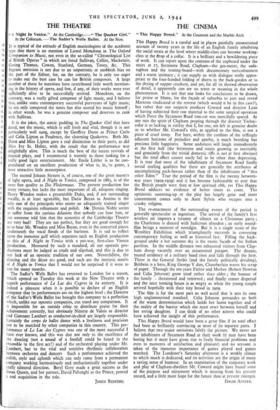THE THEATRE
A Night In Venice." At the Cambridge.—" The Quaker Girl."
At the Coliseum. The Sadler's Wells Ballet. At the New.
IT is typical of the attitude of English musicologists of the academic type that there is no mention of Lionel Monckton in The Oxford Companion to Music, not even in the so-called " Chronological List of British Operas " in which are listed Sullivan, Cellier, Mackenzie, Goring Thomas, Cowen, Stanford, German, Tovey, &c. This flagrant omission is not due to an unpatriotic or snobbish bias on the part of the Editor, for, on the contrary, he is only too eager to make out the best case he can for British composers. A large number of those he mentions have contributed little worth mention- ing in the history of opera, and few, if any, of their works were ever sufficiently alive to be successfully revived. Monckton, on the contrary, was a really gifted composer of light music, and I believe that, unlike some contemporary successful purveyors of light music, he not only composed the tunes but also scored his music himself ; in other words. he was a genuine composer and deserves to rank with Sullivan.
It is the jokes, the comic padding in The Quaker Girl that have dated, not the music, which is still fresh and vital, though it is not particularly well sung, except by Geoffrey Dunn as Prince Carlo and Celia Lipton as Prudence, the charming Quakeress. Both Mr. Dunn and Miss Lipton gave a real distinction to their parts, as did Miss Ivy St. Helier, with the result that the performance was delightfully alive. This is much the best of the recent revivals of musical plays, and I recommend it warmly to those looking for a really good light entertainment. Mr. Emile Littler is to be con- gratulated on an excellent production of what is, in.:ts genre, a most attractive little masterpiece.
The second Johann Strauss is, of course, one of the great masters of light opera, and A Night in Venice, composed in 1883, is of the same fine quality as Die Fledermaus. The present production has many virtues, but lacks the most important of all, adequate singing. Henry Wendon makes a presentable Duke, and, if not outstanding vocally, is at least agreeable, but Dania Bayan as Annina is the only one of the principals who seems an adequately trained singer with the requisite refinement and polish. Mr. Dennis Noble seems to suffer from the curious delusion that nobody can hear him, or has someone told him that the acoustics of the Cambridge Theatre are very bad? They are not perfect, but they are good enough for us to hear Mr. Wendon and Miss Bayan, even in the concerted pieces underneath the vocal floods of the baritone. It is sad to reflect upon the immense gulf which separates such an English production as this of A Night in Venice with a pre-war, first-class Vienna production. Measured by such a standard, all our operatic pro- ductions must be judged as crude and slipshod, and this is due to our lack of an operatic tradition of our own. Nevertheless, the dancing and the decor are good, and such are the intrinsic merits of A Night in Venice that I would not be surprised if it were to run for many months.
The Sadler's Wells Ballet has returned to London for a season, which opened on Tuesday this week at the New Theatre with a superb performance of Le Lac des Cygres in its entirety. It is indeed a pleasure when it is possible to declare of an English company that its performances are on the highest level ; the Director of the Sadler's Wells Ballet has brought this company to a perfection which, unlike our operatic companies, can stand any comparison. It is impossible for an outside critic to distribute praise for their achievement correctly, but obviously Ninette de Valois as director and Constant Lambert as conductor-in-chief are largely responsible. Certainly the corps de ballet dance with a liveliness and precision not to be matched by other companies in this country. This per- formance of Le Lac des Cygnes was one of the most successful I have ever known, and this was due not only to the excellence of he dancing (not a sound of a footfall could be heard in the ensemble in the first act!) and of the orchestral playing under Mr. Lambert, but to the vital and sensitive rhythmic collaboration between orchestra and dancers Such a performance achieved the polish, style and aplomb which can only come from a permanent company working harmoniously and enthusiastically together under really talented direction. Beryl Grey made a great success as the Swan Queen, and her partner, David Paltenghi as the Prince, proved a real acquisition in the role.
JAMES REDFERN.


























 Previous page
Previous page